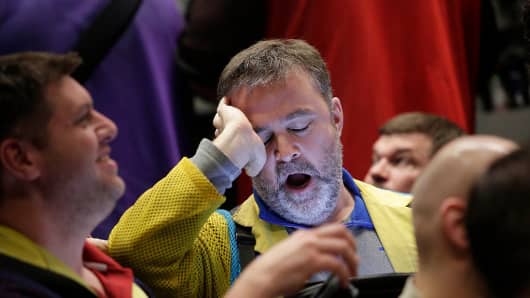It's hard to avoid the allure of panicky headlines when the Dow is below 23,000 and the Nasdaq has entered a bear market, but for every "record" stampede of investors into bonds and sudden flood of money into cash tracked by a Wall Street firm, there's a wealthy American making a money move that might seem even more shocking: not doing anything.
The latest CNBC Millionaire Survey shows that even as volatility spiked in the period since September, wealthy Americans are not making major changes to asset-allocation models. Investors with at least $1 million in investable assets surveyed by CNBC in mid-November — when volatility was already high — said they expected to keep their allocations to cash, bonds and equities similar over the next 12 months.
The results are consistent with the previous two bi-annual CNBC Millionaire Surveys (November 2017 and May 2018) and with the longer-term asset allocation decision-making of these investors since CNBC began surveying them four years ago.
Wealthy investors surveyed have tended to maintain exposure to U.S. equities of between 45 percent and 50 percent, while keeping 15 percent to 20 percent in bonds, and 12 percent to 16 percent in cash and other short-term investments. When their international exposure is added, the portfolios look similar to the classic 60/40 investment plan (60 percent equities/40 percent bonds).
It shouldn't be a surprise. Investors who have constructed a diversified investment plan based on their financial situation and risk tolerance are not going to "run for cover" when the market doesn't go in their direction — no matter what a former Federal Reserve chair like Alan Greenspan says. And while recent outflows from actively managed mutual funds have been large, exchange-traded funds have actually been taking in new money and looking at another year of massive inflows, more than $200 billion for equity ETFs and over $300 billion in all — no matter what a market guru like Jeff Gundlach says about staying away from index funds.
Michael Tucci, CEO of Lexington Wealth Management, which manages roughly $1 billion and has an average client portfolio of $2.5 million to $3 million, said there are always going to be times to choose between leaning into the market, or being neutral or leaning out. For his clients, it was a year-and-a-half ago when they decided to lean out "a little bit" based on valuations in the U.S. stock market, but not fears of a systematic contagion. "Stocks were really expensive," Tucci said.
That means thinking of moving a 60 percent equities and 40 percent bonds portfolios to 50-50 or 40-60, but not trying to make extreme moves which are more likely to be wrong. Long-term research shows that investors who do make major moves in response to market volatility are lucky if they generate a long-term return that is equal to the rate of inflation. "They sit in cash too long, pull out when market goes down and get way too conservative, and think it is a head fake when the market goes back up. ... If you're going to make changes, make small moves around the 60-40 portfolio," Tucci said.
No two investors are alike, but the investment process is similar
There are important caveats to the millionaire data. To start with, each investor has a unique financial situation, and many investors do not already have $1 million or more in an investment account. There are some 70 year-olds who maintain what seems like a high exposure to equities (50 percent) but these individuals may still be working and receiving a significant income, or they may simple not need any of their market money to live on.
"We have some 80-year-olds who are near 100 percent equities because they are investing for the next two generations," Tucci said. "They have more money than they can ever spend."
The advisor said there are a few straightforward questions that will do an investor more good than the latest calls from the market pundits.
- How much do you have in cash?
- What dividends and interest is your portfolio generating?
- How much do you currently have allocated to fixed-income?
- When you add up all of that, how many years worth of money do you have to live?
"Should you really care about equities being down X percent?" Tucci said. "Over rolling five-year periods, there aren't many when equities are down by much.
"And if you don't have a five-year horizon, you should not be in equities."
Doug Boneparth, certified financial planner and president of Bone Fide Wealth, said that, even with the markets more or less straight down since the end of November, client allocations have not changed substantially over the last several weeks. However, he said the wealthy do have an advantage as a group, even if each client has a unique situation.
"Everyone is different, but wealthy people have a greater asset base to work with, and the ability to handle volatility more than someone depending on that income," Boneparth said. "They can afford to more aggressive."
Among his younger clients, who are still generating significant professional work incomes, "they are not all that focused on the market," Boneparth added. "They are investing for the long-term and more concerned about making sure they are able to continue working. Income is what really matters here; no one is investing for the short-term."
The reckoning may still be coming
Tucci said having some cash is not a bad thing, as it affords investors the opportunity to get back into the stock market at lower levels — the "dry powder."
And even as the Fed's rate hike path remains a wildcard for the bond market, holding intermediate-term Treasurys and long-term Treasurys has a proven history of providing inexpensive portfolio stabilization. "You build something to be in the game, you build something you can live with through bad times and good times," he said.
Over the past month, the Vanguard Long-Term Treasury ETF (VGLT), iShares 20+Year Treasury Bond ETF (TLT) and SPDR Portfolio Long Term Treasury ETF (SPTL) have all returned above 4.5 percent.
The tweaks that millionaire investors have been making to portfolios for the next 12 months are just that — tweaks in the numbers that are not statistically significant.
The amount that millionaires plan to allocate to short-term investments — cash, money market funds, CDs and Treasury bills — went up to 16 percent from 14 percent in the November 2018 survey (for further reference, it had been at 13 percent in April 2016). The percentage to be allocated to bonds hasn't budget — 18 percent in all three of the most recent CNBC Millionaire Surveys, and 20 percent back in the April 2016 response. The youngest segment of millionaire investors by age (those 55 and under) have increased bond allocations to 14 percent in the current survey from 10 percent in November 2017. The planned exposure to U.S. equities, at 48 percent in the most recent survey, has actually increased, from 46 percent in the previous two periods.
Overall, these investors do have a positive outlook on the U.S. economy. They are worried more about politics than stocks. The survey was conducted between Nov. 7 and Nov. 19, so it did precede December, which has been the worst December for the market since 1931. A January reckoning for many investors may still be coming.
"The thing that stands out to me is that millionaires 55 and older barely changed their equity allocations over the last year while stocks were generally in a downtrend," said Mitch Goldberg, president of investment advisory firm ClientFirst Strategy. "The older two age brackets also held their fixed income allocations fairly stable during the last year, which is a bit surprising. You'd expect to see an increase in this asset class as the stock market trended lower. Then again, these groups have a lot more experience with volatility and they are not as easily deterred from their allocations."
Goldberg said many investors who don't check their portfolio values on a daily basis are still working off numbers in Sept. 30 portfolio statements, and those statements would have likely shown gains for the year. The December-end statements are going to present the first annual loss many investors have seen in a long time, and that may lead to a reevaluation, especially when combined with the impact of the tax law changes and loss of many valuable deductions that will become more apparent as tax filing season begins, and other negative signals from the financial markets.
"For high earners in nearly any state that has a state income tax, the loss of the SALT deduction could mean they face a higher tax bill. We just won't know for sure until after April 15 exactly how much this affects them. Then there is weakness in the housing market, which could affect anyone's personal wealth affect. Throw into the mix stats that point to a slowing global economy and no end in the trade war with China and we could really start to see those equity allocations come down."
Rash moves are a bad thing — but a reevaluation isn't. Market conditions have been so strong over the past decade that advisors have been forced to talk to clients about risk in the abstract, which never works as well as the real thing.
"Ideally, investors would simply pick the right allocation for their risk tolerance and goals and simply rebalance either periodically or based on changes to their allocation ranges because of market movement. With the Dow and S&P down by 10 percent each so far this month, investors are going to see the biggest drop in account value since at least 2016. We'll see if that could shake investors out of their allocations," Goldberg said.
Tucci said when risk actually returns to the market, it is a good time to go back and evaluate a plan and look at how much risk an investor can tolerate. But looking to the latest market panic-headlines is not where to begin.
"Flows are a good contrarian indicator to what you should be doing," Tucci said. "I always hate selling into bad times."
The CNBC Millionaire Survey is conducted twice a year in the Spring and Fall. The Fall 2018 survey was conducted between Nov. 7 and Nov. 19 among 750 investors with $1 million or more of investable assets. Respondents are required to be the financial decision-maker or share jointly in financial decision-making within the household.












